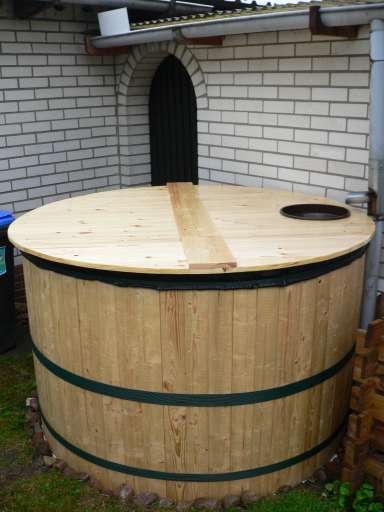thank you little pierrot for the links
We also talk a lot about Germany in this post ... but a lot of inaccurate things. I live in Germany and I collect rainwater for laundry, toilets, garden, aquarium, iron, car (battery, coolant, washer fluid, washing)
The recovery of rainwater is not problematic for these uses in the context of individual use. However, it is regulated and it can differ depending on the Lander. Me ... It's the Niedersachsen.
The pressure networks must be 100% independent.
No valve, no Y, ...
Concretely, if my reserve is empty, a float triggers a solenoid valve which takes water from the network intended for the garden ... from a second meter and pours into the reserve.
To have no worries, the plumbing installation must be done by a professional!
For water intended for housing coming from the rainwater reserve an additional (third) lead meter is installed. It accounts for the volumes that will be discharged into the sewer (toilet and washing machine). These cubic meters are reprocessed so we have to pay for it. (about 3 roros per cubic meter).
So i have three counter

- A meter A for water from the city network intended for housing (~ 4 E per cubic meter)
- A meter B for water from the city network intended for the garden (~ 1 E per cubic meter)
- A C meter for rainwater intended for housing (~ 3 E per cubic meter)
The invoice ... It's 4xA + 1xB + 3xC = lots of whales!

The gains:
- 3 E per cubic meter of rainwater instead of 4 E
- I have a demineralized water source for the 500L aquarium (this prevents me from using an osmosis unit)
- water for the garden is almost free (pump consumption)
- 3 times less detergent in the machine and a softer cloth.
This is for me the main reason for the use of rainwater.
It's already very complicated ... and to make it even less simple, a new tax will appear next year on rainwater. The quantity of water discharged into the rainwater network in equivalent cubic meters will be calculated according to the areas covered ...
I feel it ... it will take a fourth meter to calculate the cubic meters from the tank and intended for the garden! In order to deduct these cubic meters and not pay tax on them!
Go, to finish a small photo of my tank of 2300 liters that I made myself.


I detailed the realization here
https://www.econologie.com/forums/post51385.html#51385
I recover water on 60 m ^ 2 and use about 35000 liters per year of rainwater. My next reserve will certainly be more than 6000 liters!
If the recovery of rainwater tends to generalize ... there is a high probability that the law is moving towards similar billing systems.





